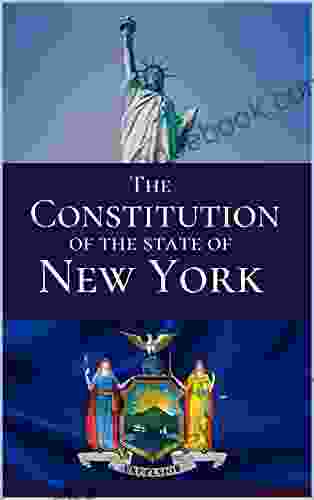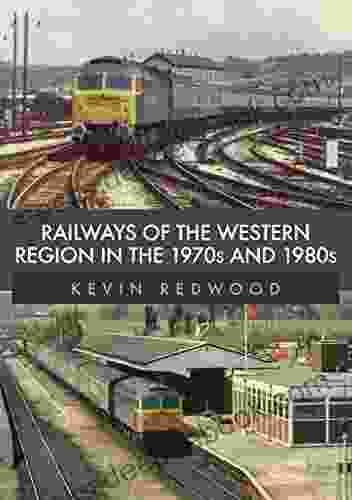The Railways of the Western Region in the 1970s and 1980s: A Comprehensive Overview

The railways of the Western Region played a vital role in the economic and social development of the region during the 1970s and 1980s. The region's railway network, which spanned over 10,000 kilometers, connected major cities and towns, and transported goods and people throughout the region. The railways also played a key role in the development of the region's mining, forestry, and agricultural industries.
4.3 out of 5
| Language | : | English |
| File size | : | 8651 KB |
| Text-to-Speech | : | Enabled |
| Screen Reader | : | Supported |
| Enhanced typesetting | : | Enabled |
| Word Wise | : | Enabled |
| Print length | : | 150 pages |
The Railway Network
The Western Region's railway network was one of the most extensive in the country. It consisted of over 10,000 kilometers of track, which connected major cities and towns throughout the region. The network was divided into two main lines: the North Line, which ran from the capital city of Accra to the northern city of Tamale, and the South Line, which ran from Accra to the southern city of Takoradi.
The North Line was the more important of the two lines, as it carried the majority of the region's freight and passenger traffic. The line was also used to transport goods to and from the landlocked countries of Burkina Faso and Mali. The South Line was less important, but it still played a vital role in the development of the region's coastal areas.
Operations
The Western Region's railways were operated by the Ghana Railway Corporation (GRC). The GRC was a state-owned corporation that was responsible for the operation of all railways in the country. The GRC operated a wide range of trains, including passenger trains, freight trains, and mixed trains.
Passenger trains were the most important type of train operated by the GRC. These trains carried passengers between major cities and towns throughout the region. The GRC also operated a number of express trains, which provided faster service between major cities.
Freight trains were used to transport goods throughout the region. These trains carried a variety of goods, including minerals, timber, and agricultural products. The GRC also operated a number of special trains, which were used to transport specific types of goods, such as petroleum products and livestock.
Mixed trains were a type of train that carried both passengers and freight. These trains were used to serve smaller communities that were not served by passenger or freight trains.
Economic Impact
The railways of the Western Region had a major impact on the region's economy. The railways provided a reliable and efficient means of transportation for goods and people, which helped to stimulate economic growth. The railways also played a key role in the development of the region's mining, forestry, and agricultural industries.
The mining industry was one of the most important industries in the Western Region. The railways were used to transport minerals from the mines to the ports, where they were exported to other countries. The railways also played a key role in the development of the forestry industry. The railways were used to transport timber from the forests to the sawmills, where it was processed into lumber. The railways also played a key role in the development of the agricultural industry. The railways were used to transport agricultural products from the farms to the markets, where they were sold to consumers.
Social Impact
The railways of the Western Region also had a major impact on the region's society. The railways provided a means of transportation for people to travel between different parts of the region. This helped to improve communication and trade between different communities. The railways also played a key role in the development of education and health care in the region. The railways were used to transport teachers and doctors to rural communities, where they provided essential services to the people.
The railways of the Western Region played a vital role in the economic and social development of the region during the 1970s and 1980s. The region's railway network, which spanned over 10,000 kilometers, connected major cities and towns, and transported goods and people throughout the region. The railways also played a key role in the development of the region's mining, forestry, and agricultural industries.
The railways of the Western Region are a testament to the importance of transportation infrastructure for economic and social development. The railways have played a vital role in the development of the region, and they continue to play an important role in the region's economy and society today.
4.3 out of 5
| Language | : | English |
| File size | : | 8651 KB |
| Text-to-Speech | : | Enabled |
| Screen Reader | : | Supported |
| Enhanced typesetting | : | Enabled |
| Word Wise | : | Enabled |
| Print length | : | 150 pages |
Do you want to contribute by writing guest posts on this blog?
Please contact us and send us a resume of previous articles that you have written.
 Book
Book Chapter
Chapter Genre
Genre Reader
Reader Library
Library Paperback
Paperback E-book
E-book Magazine
Magazine Newspaper
Newspaper Sentence
Sentence Foreword
Foreword Annotation
Annotation Footnote
Footnote Manuscript
Manuscript Scroll
Scroll Tome
Tome Classics
Classics Narrative
Narrative Memoir
Memoir Reference
Reference Encyclopedia
Encyclopedia Narrator
Narrator Character
Character Card Catalog
Card Catalog Stacks
Stacks Archives
Archives Periodicals
Periodicals Scholarly
Scholarly Lending
Lending Reserve
Reserve Reading Room
Reading Room Rare Books
Rare Books Special Collections
Special Collections Interlibrary
Interlibrary Study Group
Study Group Dissertation
Dissertation Storytelling
Storytelling Awards
Awards Reading List
Reading List Theory
Theory Morgan Rice
Morgan Rice Adriana Anders
Adriana Anders Cynthia Dewi Oka
Cynthia Dewi Oka Lara Casanova
Lara Casanova Matthew Kroenig
Matthew Kroenig Adriana Kritter
Adriana Kritter Dennis Garcia
Dennis Garcia Dan Smith
Dan Smith Toshiro Ogawa
Toshiro Ogawa Terry Orlick
Terry Orlick Dai Pryce
Dai Pryce Robert Grant
Robert Grant Ian Lendler
Ian Lendler Roy Williams
Roy Williams C Keith Waugh
C Keith Waugh Anna Hrachovec
Anna Hrachovec Mercedes Rochelle
Mercedes Rochelle Sara Goodman Confino
Sara Goodman Confino B L Barreras
B L Barreras Joy Beth Smith
Joy Beth Smith
Light bulbAdvertise smarter! Our strategic ad space ensures maximum exposure. Reserve your spot today!

 Miguel de CervantesDeath At The Clos Du Lac: An Enigmatic Murder Mystery with Inspector Lucas...
Miguel de CervantesDeath At The Clos Du Lac: An Enigmatic Murder Mystery with Inspector Lucas...
 Nathaniel HawthorneLooking for Lincoln: A Historical Adventure with the History Hounds, One
Nathaniel HawthorneLooking for Lincoln: A Historical Adventure with the History Hounds, One Jay SimmonsFollow ·6.2k
Jay SimmonsFollow ·6.2k Chase MorrisFollow ·12.8k
Chase MorrisFollow ·12.8k Elliott CarterFollow ·12.2k
Elliott CarterFollow ·12.2k Jack LondonFollow ·11.3k
Jack LondonFollow ·11.3k Marcus BellFollow ·16.6k
Marcus BellFollow ·16.6k Dave SimmonsFollow ·12.2k
Dave SimmonsFollow ·12.2k Alexander BlairFollow ·2.2k
Alexander BlairFollow ·2.2k Gabriel Garcia MarquezFollow ·3.4k
Gabriel Garcia MarquezFollow ·3.4k

 Amir Simmons
Amir SimmonsMore Zeal Than Discretion: A Closer Look at the Risks and...
Enthusiasm is often seen as a positive...

 Wayne Carter
Wayne CarterYear of the Dog: American Poets Continuum 178
Year of the Dog is a...

 David Foster Wallace
David Foster WallaceThe Constitution of the State of New York: A...
The Constitution of the...

 Harvey Bell
Harvey BellSmall Cetaceans of Japan: Exploitation and Biology
Small cetaceans, including...

 Blake Bell
Blake BellEffortless Elegance: A Comprehensive Guide to Captivating...
In the realm of crocheting,...
4.3 out of 5
| Language | : | English |
| File size | : | 8651 KB |
| Text-to-Speech | : | Enabled |
| Screen Reader | : | Supported |
| Enhanced typesetting | : | Enabled |
| Word Wise | : | Enabled |
| Print length | : | 150 pages |










